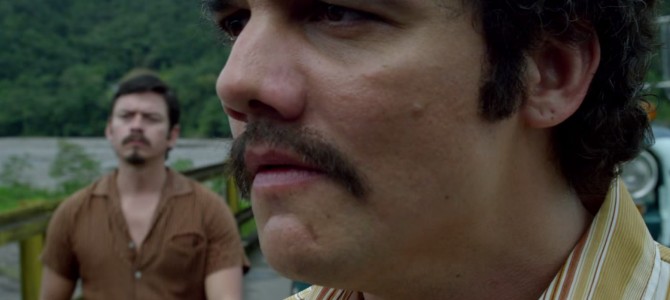Netflix is a few years into producing its own original programming, and the results have been encouraging, if a bit uneven. We’ve been treated to some truly innovative and entertaining television. We’ve also gotten some real stinkers (I’m looking at you, “Hemlock Grove”—or rather, I’m not).
Yet their output includes some of the best television you can watch outside of AMC or HBO. “Daredevil” was stylish Marvel fare, and “Unbreakable Kimmy Schmidt” barely gave me time to breathe between the laughter. I’m no less enthusiastic about Netflix using its clout to resurrect canceled shows—“Longmire,” especially. What a time to be alive.
Still, some Netflix Originals have failed to deliver on their promise. After the fourth time I fell asleep watching the first episode of “Marco Polo,” I took the hint. Even the most critically acclaimed of their series, “House of Cards and “Orange Is the New Black,” slumped in the third seasons.
“Narcos” is a welcome addition to this mixed catalogue. The show chronicles the rise of Pablo Escobar, an infamous cocaine smuggler and terrorist, alongside and intertwined with the story of the Drug Enforcement Administration (DEA) agents working with American and Colombian authorities to bring los narcotraficantes to justice. It moves fast, covering a lot of historical, political, cultural, and dramatic ground in each of its ten episodes.
Carefully Developed Story Context
My wife and I worked our way through the season quickly, though we didn’t binge on it, because binge-watching is a dolorous habit of the lonely and undisciplined. The show is better when consumed at a more leisurely pace, for reasons that will become apparent in a moment. However you decide to watch, it’s worth your time.
“Narcos” is hardly flawless, but it is distinguished by its creator’s effort to place the story of Escobar in context for the viewer. The “rise and fall” storyline is not a groundbreaking concept, but “Narcos” benefits from being shot almost as a docudrama. Even the camera work is firmly grounded, resisting the urge to get too flashy despite shooting on location in Colombia.
The opening scenes invite—more like insist upon—a comparison to “Goodfellas,” but the narration does more than set the scene. It carefully traces the connection between events, trends, and relationships to develop the audience’s understanding of Colombia, the cocaine trade, and America’s role in the rise of Escobar and the cartels.
We know how things turn out for Escobar, but the show’s writers flesh him out in a way most of us haven’t seen before. Opening with a short discourse on magical realism is also as good a way as any to let us know that some of the incredible story has been dramatized. It’s a credit to the writing (or a black mark against Escobar) that it’s difficult to determine what’s fact and what’s legend.
A Strong Pablo Escobar
The performances are often compelling and never less than adequate. Boyd Holbrook plays the narrator, DEA agent Steve Murphy. He’s driven by duty and revenge after the death of his partner, but grows increasingly ambivalent about whether “right and wrong” apply to his mission. Murphy’s increasing level of comfort with the insane violence of Colombia saves him from being a cardboard cutout.
Some have criticized Holbrook’s performance, calling him “more mustache than man,” but his character’s place on the periphery allows other real-life characters who are part of the action to remain in sharper focus. (Worth noting is the charismatic Pedro Pascal, last seen on “Game of Thrones” [spoiler alert] having his head popped like a grape. He turns in a solid performance as Murphy’s less-idealistic partner, Oscar Peña.)
The best performance by far is from Wagner Moura, who gives us a Pablo Escobar that is simultaneously goofy, sympathetic, and willing to murder anyone who stands in his way. Our first introduction to Pablo is a confrontation between the smuggler and a police checkpoint. After the cops refuse to be bribed, Escobar calmly, almost pleasantly, asks after each of their family members by name, punctuating this very clear threat with his motto: Plata, o plomo (silver, or lead).
Moura physically inhabits Escobar’s pudgy physique, grunting and walking around belly-first in tight, 1980s shirts. This somehow makes the character more menacing. That menace is a pleasure to watch, as is the slow unraveling of Escobar’s empire. “Narcos” humanizes Escobar, but doesn’t ever excuse him.
Netflix’s Learning Curve
The first season of “Narcos” covers about a dozen years or so, and by the end Escobar is only a year and a half from death. Presumably the second season, which has already been greenlit, will slow down and focus on the morally ambiguous manhunt detailed in the book “Killing Pablo.” Then, presumably, the series will end. That’s another benefit to Netflix’s original programming—driven less by ratings, they can tell a story, then finish it before the concept drags on too long.
Netflix is still figuring out its original programming, and is bound to make a few more missteps. Long term, they’ll need fewer Marcos and more “Narcos,” but for now they have the freedom to experiment to see what works and what doesn’t. “Narcos” works, and is worth your time.









